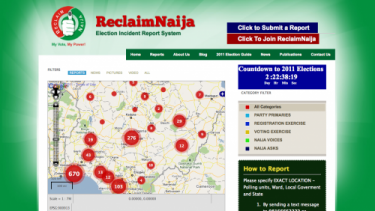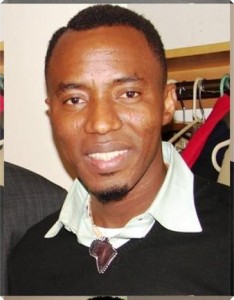This post is part of our special coverage Nigeria Elections 2011.
2011 will go down in Nigeria's history as the year of the nation's third presidential election since independence. For the first half of the year, the blogosphere was abuzz with discussion of the election: protests, campaigns, debates, the role of technology, preparations for the polls, election day itself.
In the wake of the election, violence erupted in Northern Nigeria, marring hopes for a new era. Despite small victories in the political and cultural landscapes, the latter part of the year was overshadowed by sectarian violence in the northern part of the country.
A historic election
Nigeria has a tradition of rotating the presidency between candidates from the Muslim-majority North and Christian-majority South. This arrangement was upset when former President Umaru Yar'Adua died in office in 2010, leaving his second-in-command, southerner Goodluck Jonathan to fill the position.
Jonathan's subsequent presidential run in 2011 angered many northerners, who felt the north had been cheated out its turn in power.

A broad-based national movement, Reclaim Naija, used Ushahidi-based platform to monitor elections. Image source: Reclaim Naina website.
The election was widely hailed as being “free and fair” despite some minor irregularities and fraud. Nigerians celebrated this unprecedented success across the country and the diaspora. Kunle Durojaiye summed up the general sentiment:
One cannot deny that there is a sense of a wind of change. People voted, and waited behind to witness the counting and collation of votes; media stations ran a live coverage of the elections while it lasted, and very importantly, young people influenced the exercise with the flood of information available via twitter, facebook and blackberry messaging. Without mincing words, change is inevitable, but one just wonders if the stage is truly set.
Sectarian violence
However the success of the election appeared a small victory in light of the violence that followed. North-South tensions regarding the election came on top of an already charged situation in Northern Nigeria, where violent attacks and bombings have gained momentum since police forces clashed with Islamist sect Boko Haram in 2009.
Soon after Jonathan's victory, violence again erupted in the North, with a series of bombings in Abuja and elsewhere claimed by Boko Haram. As the year wore on, the intensity of the violence increased, leaving hundreds dead and forcing thousands to leave their homes.
@jongambrellAP described the situation:
@jongambrellAP: Things remain incredibly tense in rural Kaduna state as townspeople around here flee with their belongings. #nigeriadecides
Small victories
In spite of the violence, the latter part of the year also brought positive developments. Many Nigerians were excited about the appointment of Ngozi Okonjo-Iweala, former managing director of the World Bank, as Nigeria's new finance minister.
In a post titled, Nigeria: Adrift, Awaiting the Arrival of a Woman, Nwachukwu Egbunike sampled responses to Okonjo-Iweala's appointment, including this one from Nmachi Jidenma:
For corrupt and undisciplined government officials: ‘wahala dey’. It looks like ‘the trouble woman’ is back in town! This is of course good news for Nigerians and most of us would be happy to have her back.
In another post, Egbunike pointed to Sahara Reporters, dubbed “Nigeria's Wikileaks”, as a bastion of free expression in a troubled landscape for press freedom.
The 419 Positive Project collected developments like these and challenged people to say something positive about Nigeria in hopes of changing the country's negative image.
@gbengasesan wrote of the project:
I have travelled across Nigeria, and met Nigerians around the world and I have noticed a kind of ‘Nigerian energy’ about them — the ability to get things done under unbelievable circumstances. It may be related to the challenges they have had to endure, but no one can deny the fact that when a Nigerian sets their mind on a goal, little can discourage them.
This post is part of our special coverage Nigeria Elections 2011.







